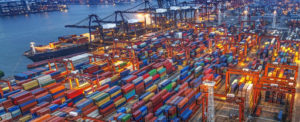There are fears of congestion at the Apapa and Tin Can Island ports in Lagos State, Nigeria, after the coronavirus lockdown.
Despite the directive by the Secretary to the Government of the Federation, Boss Mustapha, who also heads the Presidential Task Force on COVID-19 to all service providers at the seaports, including banks, to operate at full scale, Financial Street investigations reveal that port operation and activities at the Lagos Port Complex, Apapa and the Tin Can Port have remained at skeletal level.
This has fuelled fears of possible congestion at the seaports after COVID-19 among importers and their clearing agents.
President, Africa Association of Professional Freight Forwarders and Logistics of Nigeria, Frank Ogunjemite, told our correspondent that the ports were not working optimally.
“The ports in Lagos are not working adequately, so I am not certain that goods are adequately being released from the ports, compared to when the pandemic was not there,” he said.
Also, the Chief Executive Officer of Denrick Logistics, Nicholas Momah, confirmed that while port activities were moving on, only a few banks were opening their offices at the ports, making it difficult or impossible for customs agents to pay tariffs for imported cargoes.
“The ports are working, the terminals are open, but only a few banks at the ports are working. The problem with this is that we are not able to pay for Customs charges,” he said.

A stakeholder, Ayokunle Sulaiman, told journalists that with only two shipping companies at Nigerian ports digitalised for online transactions, terminal operators were not able to release cargoes because customs agents were not able to obtain debit notes from shipping companies that had not been opening shops.
He said, “The COVID-19 has exposed the weakness of the shipping lines in Nigeria. Only MSC and Maersk shipping companies have digital operations and they are trying their best.
“Another problem is that less than 10 per cent of the banks are working right now. There are shipping companies that if you don’t go to the bank, you cannot make payments. Examples are COSCO Shipping, Ocean Network and others.”
Terminal operators had, on March 30, raised the alarm over imminent congestion at the seaports in Lagos.
The port operators said massive congestion was looming at the ports in Lagos because consignees and their agents were not taking delivery of their cargoes.
The seaport concessionaires said their facilities were 90 to 95 per cent full, raising fears of congestion at the ports.
Seaport Terminal Operators Association of Nigeria said that while it was good that the seaports would be working to support government’s effort at curtailing the spread of the coronavirus disease, there was need to allow full movement of cargo across the country, to ensure their operations were not hampered.
“All terminals in Lagos are between 90 and 95 per cent full. Most of the cargoes are non-essential. If cargo doesn’t flow, within days, there will be no space in the terminals to discharge other cargoes. Some of the cargoes awaiting discharge include food and medicine.
“There is a need, therefore, to appeal to importers to pick up their cargoes and not return empties for next two weeks, to allow the
prioritisation of imports coming in.
“If consignees do not remove their cargoes in the next couple of days, the ports will become fully congested and it will be near impossible to discharge incoming vessels,” said STOAN spokesman, Bolaji Akinola.
Akinola said that the multiplicity of government agencies at the ports and at the exit gates at Tin Can and Apapa ports was compounding the “painfully slow delivery of cargo.”
His words, “These government agencies are working at odds with the Federal Government’s policy on the Ease of Doing Business. There are too many government agencies involved in the cargo release process, and after the cargo is released in the terminal, these government agencies, including the Nigeria Customs Service, conduct another round of checks at the port gate.
“The situation has resulted in long truck queues inside the ports because the rate at which trucks exit the main port gate is extremely slow due to these multiple checks.”


